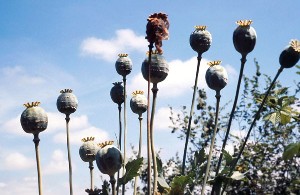Asia:
Plan
to
Legalize
Afghan
Opium
Production
Drawing
Attention
7/29/05
Back in March, we reported on a proposal by the European drug policy think tank the Senlis Council to deal with Afghanistan's opium crop, which makes up 90% of the global supply, by diverting it into the legitimate medical market. Although dismissed by some US drug fighters out of hand, the Afghan government was not so quick to naysay the idea. In fact, the Senlis Council has set up offices in Kabul and is currently engaged in discussions with non-governmental organizations (NGOs) and Afghan regional authorities about setting up pilot programs beginning next year.
The notion of diverting Afghanistan's bumper crop of poppies away from the black market and, ultimately, the veins of Western junkies, and into a global medicinal market where current opium supplies are so tight as to make opioid medications effectively unavailable to the Third World, is starting to get some attention. With the opium trade accounting for 60% of Afghanistan's Gross Domestic Product, trying to wipe out the crop could prove destabilizing for the government of Hamid Karzai, which, along with its Western allies is also locked in a four-year-old battle with resurgent Taliban and Al Qaeda fighters. But buying the crop outright and diverting it into the medical market could be done for less than the cost of this year's $700 million US Afghan anti-drug budget. And it could take the pressure off Great Britain, which has taken a lead role in the so far futile fight to restrain production and taken flak from US government spokesman for its efforts. The idea popped up on the op-ed pages of the New York Times two weeks ago. Under the headline "Let A Thousand Licensed Poppies Bloom," Maia Szalavitz, a senior fellow at Stats, a media watchdog group, nicely tied together the Afghan opium dilemma and what she described as "the global pain crisis," with opioid pain relievers too expensive for most of the world's population. "The United States wants Afghanistan to destroy its potentially merciful crop," wrote Szalavitz. "But why not bolster the country's stability and end both the pain and the trafficking problems by licensing Afghanistan with the International Narcotics Control Board to sell its opium legally? The Senlis Council, a European drug-policy research institution, has proposed this truly winning solution. Adopting it would improve the Afghan economy, deprive terrorists of income and keep heroin away from dealers and addicts, all while offering pain relief to the third world," she suggested. That op-ed has since been reprinted in the International Herald Tribune (Paris) and the London Daily Telegraph, as well as circulating on various internet list-serves and blogs. On Monday, the staunchly conservative Financial Times (London) picked up on the theme with an article titled "Afghans to Consider Legalizing Opium," a quite friendly recitation of Senlis Council talking points. "The plan could help bring greater stability to Afghanistan and reduce illegal flows of opium to the rest of the world. It could also help fill developing nations' large demand for painkillers," the Financial Times reported. The [Senlis Council] calculates this demand could be for twice the amount of Afghanistan's annual opium harvest." With each friendly article in publications as staid as the New York Times and the Financial Times, a long-shot scheme to benefit poor, ailing Third Worlders, Afghan farmers, the Afghan government, and the "war on terror," picks up more support. It is difficult to imagine that an approach as sensible as this could win the approval of the US government, but even Washington may end up balking at the alternatives.
|

